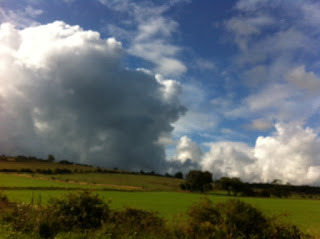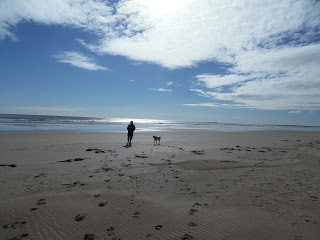Jen Black's Blog, page 34
May 4, 2019
Notes to self on Show and Tell
Show and Tell.
 Showing is walking in the footsteps of the heroine, seeing what she sees, etc etc.
Showing is walking in the footsteps of the heroine, seeing what she sees, etc etc.
But how far should this go?
I read quantities of books that don't particularly use show at all.
I keep getting comments that say I should show more. Is it some glib comment tossed around for the sake of something to say? Can a book be written in nothing else but show? Is it ever useful? Are there times when it is not useful? I decided to do some research and came up with this article first time of asking -
https://jerryjenkins.com/show-dont-tell/
I don't know who he is, but his explanation is good and clear, so I will keep it to refer to to when the clouds of confusion set in.
This is what he says:
When you tell rather than show, you simply inform your reader of information rather than allowing him to deduce anything.
You’re supplying information by simply stating it. You might report that a character is “tall,” or “angry,” or “cold,” or “tired.”That’s telling.Showing would paint a picture the reader could see in her mind’s eye.If your character is tall, your reader can deduce that because you mention others looking up when they talk with him. Or he has to duck to get through a door. Or when posing for a photo, he has to bend his knees to keep his head in proximity of others.Rather than telling that your character is angry, show it by describing his face flushing, his throat tightening, his voice rising, his slamming a fist on the table. When you show, you don’t have to tell.Cold? Your character pulls her collar up, tightens her scarf, shoves her hands deep into her pockets, turns her face away from the biting wind.Tired? He can yawn, groan, stretch. His eyes can look puffy. His shoulders could slump. Another character might say, “Didn’t you sleep last night? You look shot.”When you show rather than tell, you make the reader part of the experience. Rather than having everything simply imparted to him, he sees it in his mind and comes to the conclusions you want.What could be better than engaging your reader—giving him an active role in the storytelling—or should I say the story-showing?ExamplesTelling: When they embraced she could tell he had been smoking and was scared.Showing: When she wrapped her arms around him, the sweet staleness of tobacco enveloped her, and he was shivering.Telling: The temperature fell and the ice reflected the sun.Showing: Bill’s nose burned in the frigid air, and he squinted against the sunreflecting off the street.Telling: Suzie was blind.Showing: Suzie felt for the bench with a white cane.Telling: It was late fall.Showing: Leaves crunched beneath his feet.Telling: She was a plumber and asked where the bathroom was.Showing: She wore coveralls carried a plunger and metal toolbox, and wrenches of various sizes hung from a leather belt around her waist. “Point me to the head,” she said.Telling: I had a great conversation with Tim over dinner and loved hearing his stories.Showing: I barely touched my food, riveted by Tim. “Let me tell you another story,” he said.Yes, it’s a mistake to take show, don’t tell as inviolable. While summary narrative is largely frowned upon, sometimes it’s a prudent choice. If there’s no value to the plot/tension/conflict/character arc by showing some mundane but necessary information, telling is preferable.For instance, say you have to get your character to an important meeting and back, before the real action happens. Maybe he has to get clearance from his superiors before he can lead a secret raid.Rather than investing several pages showing every aspect of the trip from packing, dressing, getting a cab to the airport, going through security, boarding the plane, arriving at his destination—you quickly tell that this way:Three days later, after a trip to Washington to get the operation sanctioned by his superiors, Casey packed his weapons and camo clothes and set out to recruit his crew.Then you immediately return to showing mode, describing his visits to trusted compatriots and getting them on board.
 Showing is walking in the footsteps of the heroine, seeing what she sees, etc etc.
Showing is walking in the footsteps of the heroine, seeing what she sees, etc etc.But how far should this go?
I read quantities of books that don't particularly use show at all.
I keep getting comments that say I should show more. Is it some glib comment tossed around for the sake of something to say? Can a book be written in nothing else but show? Is it ever useful? Are there times when it is not useful? I decided to do some research and came up with this article first time of asking -
https://jerryjenkins.com/show-dont-tell/
I don't know who he is, but his explanation is good and clear, so I will keep it to refer to to when the clouds of confusion set in.
This is what he says:
When you tell rather than show, you simply inform your reader of information rather than allowing him to deduce anything.
You’re supplying information by simply stating it. You might report that a character is “tall,” or “angry,” or “cold,” or “tired.”That’s telling.Showing would paint a picture the reader could see in her mind’s eye.If your character is tall, your reader can deduce that because you mention others looking up when they talk with him. Or he has to duck to get through a door. Or when posing for a photo, he has to bend his knees to keep his head in proximity of others.Rather than telling that your character is angry, show it by describing his face flushing, his throat tightening, his voice rising, his slamming a fist on the table. When you show, you don’t have to tell.Cold? Your character pulls her collar up, tightens her scarf, shoves her hands deep into her pockets, turns her face away from the biting wind.Tired? He can yawn, groan, stretch. His eyes can look puffy. His shoulders could slump. Another character might say, “Didn’t you sleep last night? You look shot.”When you show rather than tell, you make the reader part of the experience. Rather than having everything simply imparted to him, he sees it in his mind and comes to the conclusions you want.What could be better than engaging your reader—giving him an active role in the storytelling—or should I say the story-showing?ExamplesTelling: When they embraced she could tell he had been smoking and was scared.Showing: When she wrapped her arms around him, the sweet staleness of tobacco enveloped her, and he was shivering.Telling: The temperature fell and the ice reflected the sun.Showing: Bill’s nose burned in the frigid air, and he squinted against the sunreflecting off the street.Telling: Suzie was blind.Showing: Suzie felt for the bench with a white cane.Telling: It was late fall.Showing: Leaves crunched beneath his feet.Telling: She was a plumber and asked where the bathroom was.Showing: She wore coveralls carried a plunger and metal toolbox, and wrenches of various sizes hung from a leather belt around her waist. “Point me to the head,” she said.Telling: I had a great conversation with Tim over dinner and loved hearing his stories.Showing: I barely touched my food, riveted by Tim. “Let me tell you another story,” he said.Yes, it’s a mistake to take show, don’t tell as inviolable. While summary narrative is largely frowned upon, sometimes it’s a prudent choice. If there’s no value to the plot/tension/conflict/character arc by showing some mundane but necessary information, telling is preferable.For instance, say you have to get your character to an important meeting and back, before the real action happens. Maybe he has to get clearance from his superiors before he can lead a secret raid.Rather than investing several pages showing every aspect of the trip from packing, dressing, getting a cab to the airport, going through security, boarding the plane, arriving at his destination—you quickly tell that this way:Three days later, after a trip to Washington to get the operation sanctioned by his superiors, Casey packed his weapons and camo clothes and set out to recruit his crew.Then you immediately return to showing mode, describing his visits to trusted compatriots and getting them on board.
Published on May 04, 2019 04:31
April 25, 2019
Only dimwits forget the market
 Every so often I trawl through my documents file and get rid of stuff I don't need any more. Sometimes I find little gems - here's one, written a long time ago by Stephen King. I've shortened it a good deal but you can find the original if you google it. The comments in italics are mine
Every so often I trawl through my documents file and get rid of stuff I don't need any more. Sometimes I find little gems - here's one, written a long time ago by Stephen King. I've shortened it a good deal but you can find the original if you google it. The comments in italics are mineTips for writing from Stephen KingType. Double-space. Use a nice heavy white paper. (I wonder if he does the equivalent on a computer?)Be self-critical. (Sometimes I think I'm too self-critical)
Remove every extraneous word. (And by do they creep in....)
You want to write for money? Get to the point. And if you remove all the excess garbage and discover you can’t find the point, tear up what you wrote and start all over again . . . or try something new. Never look at a reference book while doing a first draft
When you sit down to write, write. Don’t do anything else except go to the bathroom, and only do that if it absolutely cannot be put off. Know the markets
Only a dimwit would send a tender story about a mother and daughter making up their differences on Christmas Eve to Playboy … but people do it all the time. If you write a good story, why send it out in an ignorant fashion? Would you send your kid out in a snowstorm dressed in Bermuda shorts and a tank top? Write to entertain
Somewhere along the line pernicious critics have invested the American reading and writing public with the idea that entertaining fiction and serious ideas do not overlap. This would have surprised Charles Dickens, not to mention Jane Austen, John Steinbeck, William Faulkner, Bernard Malamud, and hundreds of others. But your serious ideas must always serve your story, not the other way around. (I think serious ideas survive in the UK fiction. Not that they are always an entertaining read.)Ask yourself frequently, “Am I having fun?”
The answer needn’t always be yes. But if it’s always no, it’s time for a new project or a new career.How to evaluate criticism
It doesn’t matter if you really liked that twist of that character; if a lot of people are telling you something is wrong with your piece, it is. If seven or eight of them are hitting on that same thing, I’d still suggest changing it. But if everyone – or even most everyone – is criticizing something different, you can safely disregard what all of them say.An agent? Forget it. For now
Flog your stories around yourself. If you’ve done a novel, send around query letters to publishers, one by one, and follow up with sample chapters and/or the manuscript complete. And remember Stephen King’s First Rule of Writers and Agents, learned by bitter personal experience: You don’t need one until you’re making enough for someone to steal … and if you’re making that much, you’ll be able to take your pick of good agents.If it’s bad, kill it
When it comes to people, mercy killing is against the law. When it comes to fiction, it is the law.
Published on April 25, 2019 01:58
April 18, 2019
An Ethnic Enigma
 An Ethnic Enigma – Norse, Pict and Gael in the Western IslesAndrew Jennings and Arne Kruse Introduction What happened to the native people of the islands of Scotland when the Vikings appeared over the horizon? Were the men killed and the womenfolk bundled on to the ships, leaving the land empty and ripe for resettlement? Or did they survive the Viking visitation living alongside the newcomers and ultimately blending with them? There is still no consensus about which scenario best approximates to the truth, despite it being, for many decades, a topic of debate between scholars.
An Ethnic Enigma – Norse, Pict and Gael in the Western IslesAndrew Jennings and Arne Kruse Introduction What happened to the native people of the islands of Scotland when the Vikings appeared over the horizon? Were the men killed and the womenfolk bundled on to the ships, leaving the land empty and ripe for resettlement? Or did they survive the Viking visitation living alongside the newcomers and ultimately blending with them? There is still no consensus about which scenario best approximates to the truth, despite it being, for many decades, a topic of debate between scholars. Busy doing my research - mugging up on facts about Viking life in the years around the first millennium. The above paragraph about sums up the position, but of course, people taken their own and argue the hind leg off a donkey, as we used to say, to preserve their viewpoint. I haven't decided on my stance yet, but it is always good to know the parameters of an argument. In the Viking books I've written so far - Far After Gold, Viking Summer and Magician's Bride and of course Alba is Mine,I haven't really had to make a decision, but I have a niggling feeling I might have to this time.
Published on April 18, 2019 01:43
April 16, 2019
Is Ted H innocent?
 Four daffodils still flower my garden, and soon they too will be gone. They were glorious in the sunshine. My one tulip is still a tight bud. (Every year I swear I will buy more to keep it company, and each year I leave it too late...)
Four daffodils still flower my garden, and soon they too will be gone. They were glorious in the sunshine. My one tulip is still a tight bud. (Every year I swear I will buy more to keep it company, and each year I leave it too late...)I have one question about Line of Duty. If Ted H is innocent, why is he rushing his computer into a dodgy-looking shop that advertises erasure of pcs? Well, no, there is another question - what is he doing sleeping with the Bigelow creature? She is toxic all the way through.
The writer is doing an excellent even-handed job of making us think Ted is guilty and then thinking Bigelow and the insurance man Moffat are trying to frame him. One has to keep watching to see which will prove correct! If I'm right that two people are trying to frame him, then Ted must be innocent or why would they try?
But what about that computer? He doesn't want his financial details known? or that he is facing divorce? Realises he is under threat and wants his private family life kept private? If so, he is too late because that man with the accent I can hardly make out has already discovered where his wife lives. John is a man under pressure, and about to crack. I thought he was about to shoot himself, and what a pity he didn't. One thing I notice: Steve Arnott is being sidelined to some extent. Except for saying S**t at regular intervals, Kate isn't doing much with her new promotion.
Published on April 16, 2019 03:13
April 8, 2019
Binge tv
 Never thought I'd say this but I've just binge-watched Line of Duty series 1-4. Three episodes per night was more than enough for my brain to keep up with, but tonight we reached the end of series 4. Now it is on to I-player and then the real live episode 5.
Never thought I'd say this but I've just binge-watched Line of Duty series 1-4. Three episodes per night was more than enough for my brain to keep up with, but tonight we reached the end of series 4. Now it is on to I-player and then the real live episode 5.I remember the Steve Arnott character (Martin Crompton?sp) as the teenage chef late in the series of Monarch of the Glen. He hasn't changed much except his face might be a little chunkier. Then he was a cheeky chappy, but now I like his intensity in this production.
Watching has stopped me getting on with my editing and partaking in much chatting on Facebook. It has also stopped me promoting my books!
I am "attending" a webinar on Thursday night in the hope of learning better ways to promote. Does one "attend" a webinar? I don't know, but I've booked my place. I'll let you know what happens.
Published on April 08, 2019 12:35
March 31, 2019
Not a happy time
 Frogspawn is in our mini pond again this year. Several weeks later than our next door neighbour - but then his pond is much larger and I think that is where the local stud frog resides most of the time. Some of the trees have greened up nicely this week, hawthorn, gorse and some of the fruiting wild cherries are in bloom and I've planted out some primroses and Dianthus - so now the weather forecasts are predicting frost this evening. I hope they all withstand the sudden cold.
Frogspawn is in our mini pond again this year. Several weeks later than our next door neighbour - but then his pond is much larger and I think that is where the local stud frog resides most of the time. Some of the trees have greened up nicely this week, hawthorn, gorse and some of the fruiting wild cherries are in bloom and I've planted out some primroses and Dianthus - so now the weather forecasts are predicting frost this evening. I hope they all withstand the sudden cold.I wouldn't want to be a police officer these days; not that I ever did. The tv shows such ugly scenes with enraged people yelling at each other that the officers must feel their lives are in danger every time they show up for work.
I keep thinking of the research with rats that claims the creatures will live peaceably together in one habitat until numbers increase beyond an invisible line and suddenly they start squabbling with each other because they are overcrowded. Not that people are rats; but put too many people together in one place....with nowhere to go....is it a possibility? I hope not.
Developers put up netting to prevent birds nesting and presumably they think the birds can go elsewhere. Have they looked around them these days? Everywhere green spaces are being built on and the poor creatures have nowhere to live. I'm looking at my garden wondering if i can make it more bird friendly.
Published on March 31, 2019 03:36
March 22, 2019
Do you talk like a character in a book?
 Blossom is early in 2019This interview with Phillippa Gregory interested me. She's talking about language in her books:
Blossom is early in 2019This interview with Phillippa Gregory interested me. She's talking about language in her books:"In terms of styles of language‚ I deliberately took the choice to use fundamentally modern language‚ but quite pure and quite simple. So I don′t use slang and I don′t use modern idioms. This is to make it acceptable to a wider audience and to write as well as I possibly can without being limited by language.
For example‚ if I was to write a novel set in France and there were French people speaking French to each other − I wouldn′t put that on the page in French‚ I′d put it in English − and the reader understands as it′s part of a convention of reading a novel‚ that when someone is speaking Russian or French you don′t get a page of Russian or French − you get it in English.
If someone said to me that the past is a foreign country‚ it seems to me that it speaks a foreign language. So in terms of any notion of thee and thus and thy‚ superfluous words‚ I tend not to use them as it′s so strange to the modern eye. You also gain nothing by using them and the chances of rendering them correctly are very slim.
In the case of early modern society we don′t know how they spoke‚ we know how people have written down Shakespeare plays‚ but we don′t know how people actually spoke or what they sounded like. We do believe however that Anne Boleyn maintained the French accent throughout her life as she believed that it made her a bit special‚ I mention this in the novel. But in terms of how actually people spoke‚ we don′t know‚ so I won′t even make a guess."
Some authors do attempt language as they thought it was spoken. Patricia Finney is one of them. I once tried her book Firedrake's Eye, but didn't get very far with it. More of a struggle than a pleasure in my view, but of course, others love it. She "endows her players with a rich language--essentially modern English lightly laced with fanciful syntax and Elizabethan vocabulary."
On Nov 26, 2003 Roz Kaveney wrote in the Telegraph : "The books' language is a triumph. Finney finds a workable compromise between anachronistic slanginess and a verbose rhodomontade that would probably more accurately represent much of Elizabethan speech."
Now rhodomontade is not in my trusty dictionary, but rhodo means rose coloured. However, the internet tells me it means "pretentiously boastful or bragging." Still, it doesn't tempt me to go find the book and read it. Would you?
Published on March 22, 2019 04:46
March 12, 2019
Self-Editing Your Novel
Since I’m doing so much editing at the moment, it fills my mind. Different writers do different things, but if you choose to do your own editing rather than pay for it, then some thoughts here might help.I spent a good few years as part of a critique group of a fluctuating number of perhaps 12 to 15 writers, so I got to see a lot of stories of various types, written by all sorts of people. What I saw there helped me to become a better writer. By spotting the good and bad in others, I learned to (hopefully!) spot what is good and bad in my own work.After plenty of time has passed since you raced the words down and typed The End, take up your printed pages and a marker pen. As you read, mark the words you’d like to remove, the sentences you want to rejig, etc. At this stage, find the problem patches but don’t do anything to your computer copy. Plot inconsistencies should leap out at you. Make a note of them, and later, check your basic plot-line. Did she die in 1542 or 1568? It’s important. The two dates might be mentioned forty or more pages apart and be a slip of the memory as you were writing.
 Holiday this time last yearAbout now I’d start up the computer and begin to make the changes I’d marked – always double checking that I really agree with the decision as I go. Sometimes I stick with what I had originally!Then I do a second read through, using a different colour marker pen for the second run through. I'd do the same if I did a third run through. Occasionally I spot a first marker where Word has not saved the change I made.Consider your plot from a readers’ point of view. Is it believable? More importantly, does it work? If there is confusion, I do chapter summaries, which helps me to spot the detour where the plot went off-line You may prefer a grid or chart of some kind and it really doesn’t matter. If you can follow the logic of the plot, that is good.Once this is done, it helps to look at the balance of the book. Too much of one character? Too much on one scene? An important character gets little attention? Mark this up for attention later.As I get closer to the story and the characters, I can see where I need to deepen the character – or omit repetitive stuff. It is easy to say one thing and almost repeat it word for word 100 pages later. Spot these and remove, leaving the one which works best. My style of writing has changed over ten years. When I re-edit an old story, I find I am removing a lot of whenhe spoke, she got up, turned and glared, glanced, strode; crossing the carpet was a favourite! Now I omit them or incorporate them more gracefully. It certainly lowers the word count! I think I now have control of point-of-view and showing and telling; psychic distance was a more recent discovery but made complete sense once I knew what it was.The latest versions of Word offer better help with grammar etc and spelling; there is also a read aloud facility and when I’ve made the changes I shall sit down and let the computer read the whole thing to me. That should encourage me that I’m getting there. There may be odd things to correct like including hyphens, punctuation and the odd spelling error, or a missed word. But essentially, this is what I do. How many times I do it depends in the book!
Holiday this time last yearAbout now I’d start up the computer and begin to make the changes I’d marked – always double checking that I really agree with the decision as I go. Sometimes I stick with what I had originally!Then I do a second read through, using a different colour marker pen for the second run through. I'd do the same if I did a third run through. Occasionally I spot a first marker where Word has not saved the change I made.Consider your plot from a readers’ point of view. Is it believable? More importantly, does it work? If there is confusion, I do chapter summaries, which helps me to spot the detour where the plot went off-line You may prefer a grid or chart of some kind and it really doesn’t matter. If you can follow the logic of the plot, that is good.Once this is done, it helps to look at the balance of the book. Too much of one character? Too much on one scene? An important character gets little attention? Mark this up for attention later.As I get closer to the story and the characters, I can see where I need to deepen the character – or omit repetitive stuff. It is easy to say one thing and almost repeat it word for word 100 pages later. Spot these and remove, leaving the one which works best. My style of writing has changed over ten years. When I re-edit an old story, I find I am removing a lot of whenhe spoke, she got up, turned and glared, glanced, strode; crossing the carpet was a favourite! Now I omit them or incorporate them more gracefully. It certainly lowers the word count! I think I now have control of point-of-view and showing and telling; psychic distance was a more recent discovery but made complete sense once I knew what it was.The latest versions of Word offer better help with grammar etc and spelling; there is also a read aloud facility and when I’ve made the changes I shall sit down and let the computer read the whole thing to me. That should encourage me that I’m getting there. There may be odd things to correct like including hyphens, punctuation and the odd spelling error, or a missed word. But essentially, this is what I do. How many times I do it depends in the book!
Published on March 12, 2019 05:44
March 2, 2019
Historical romance v Historical novel
Nicola Cornick has recently written an interesting blog piece about historical romance versus historical novels.
(http://nicolacornick.co.uk/blog/2015/03/when-is-historical-romance-not-historical-romance/)
 Her lovely blog stimulated me to sort out my views on the subject.
Her lovely blog stimulated me to sort out my views on the subject.
I think both extreme ends of the range of books set in a historical period are easily recognised and acknowledged by all, but it is the section in the middle where controversy rages.
On the far left we have category romance, where the romance is the only thing the author and the reader, presumably, is interested in. Category romance specifically does not want sub-plots and sub-characters running off and doing interesting things, taking interest away from the hero and heroine. The author must focus on the couple in question. These days, interest does not stop at the bedroom door. More and more blow-by-blow encounters are detailed inside the bedroom - or the equivalent. It must be an age thing, but four and five pages of these encounters often have me skipping over them. But I digress. My taste in sex scenes may be a little less graphic, but that isn't what the post is about.
The other extreme is of course the literary end. These books are often three and four times longer and detail all sorts of other things beside the central romance - if there is one. C J Sansom manages to write almost 450 pages without a central romance featuring at all and I love his books. Cornwell's Sharpe has a few stabs at romance but there is so much more about daring-do, war and skullduggery. Writers like Forester, Clements, Winston Graham, Mitchell, Gabaldon and Parrish follow a similar pattern as we head towards the more middle of the range works.
This where the lines blur. Readers will put authors in differing places on the line. Some will say Gabaldon is literary because she has great swathes about the American War of Independence in her Outlander series. So did Mitchell in Gone with the Wind, but in both those books, the central theme is the love affair between Claire and Jamie, and Scarlett and Rhett. We could be very analytical about it and put every title on a sliding scale of romance v literary-ness, but who has the time? Certainly not me! It is a task for each reader according to their personal taste, should they chose to do it.
The other thing that affects the argument is the male-female reading bias. In general terms, though not everyone fits into these divisions, men like action, women like romance. Men like tighter writing, women want feelings explained. Men's reviews still seem to have more kudos than those written by women. Men, of course, review the Sansom, Forester, Cornwell "serious" type of historical novel. Perhaps they write better reviews? I don't think I've seen this type of historical novel reviewed by a woman, but they must, surely? If not, they ought to.
PS ~ Perhaps Byron had the answer when he said "Man's love is of man's life a part; it is a woman's whole existence." Follow that through and you have an answer to the basic question, though you may not like it.
(http://nicolacornick.co.uk/blog/2015/03/when-is-historical-romance-not-historical-romance/)
 Her lovely blog stimulated me to sort out my views on the subject.
Her lovely blog stimulated me to sort out my views on the subject.I think both extreme ends of the range of books set in a historical period are easily recognised and acknowledged by all, but it is the section in the middle where controversy rages.
On the far left we have category romance, where the romance is the only thing the author and the reader, presumably, is interested in. Category romance specifically does not want sub-plots and sub-characters running off and doing interesting things, taking interest away from the hero and heroine. The author must focus on the couple in question. These days, interest does not stop at the bedroom door. More and more blow-by-blow encounters are detailed inside the bedroom - or the equivalent. It must be an age thing, but four and five pages of these encounters often have me skipping over them. But I digress. My taste in sex scenes may be a little less graphic, but that isn't what the post is about.
The other extreme is of course the literary end. These books are often three and four times longer and detail all sorts of other things beside the central romance - if there is one. C J Sansom manages to write almost 450 pages without a central romance featuring at all and I love his books. Cornwell's Sharpe has a few stabs at romance but there is so much more about daring-do, war and skullduggery. Writers like Forester, Clements, Winston Graham, Mitchell, Gabaldon and Parrish follow a similar pattern as we head towards the more middle of the range works.
This where the lines blur. Readers will put authors in differing places on the line. Some will say Gabaldon is literary because she has great swathes about the American War of Independence in her Outlander series. So did Mitchell in Gone with the Wind, but in both those books, the central theme is the love affair between Claire and Jamie, and Scarlett and Rhett. We could be very analytical about it and put every title on a sliding scale of romance v literary-ness, but who has the time? Certainly not me! It is a task for each reader according to their personal taste, should they chose to do it.
The other thing that affects the argument is the male-female reading bias. In general terms, though not everyone fits into these divisions, men like action, women like romance. Men like tighter writing, women want feelings explained. Men's reviews still seem to have more kudos than those written by women. Men, of course, review the Sansom, Forester, Cornwell "serious" type of historical novel. Perhaps they write better reviews? I don't think I've seen this type of historical novel reviewed by a woman, but they must, surely? If not, they ought to.
PS ~ Perhaps Byron had the answer when he said "Man's love is of man's life a part; it is a woman's whole existence." Follow that through and you have an answer to the basic question, though you may not like it.
Published on March 02, 2019 03:00
February 28, 2019
Gloomy days for Indie publishing
 Gloomy days for indies
Gloomy days for indiesFacebook is abuzz about posts from Nora Roberts and others who have revealed the plagiarised, ghosted, pirated scams going on in the world of publishing. The scams have now moved into audio where Audible pays on hours listened just as Amazon pays on pages read; scammers run "loop systems" where the book just plays for hours and hours and... consequently the pay-pool for genuine audio is reducing.
In retaliation, readers are saying that therefore any book offered for free or 99 cents is ghost-written and isn't worth tuppence. Yet many indie writers have, in the past, been advised to offer a 0.99p series leader as an enticement to bring readers into the entire series. The pundits said it was a solid marketing technique; they also advised offering the book for free for a while to encourage reviews and possibly ensure an Amazon ranking.
Now readers are saying they will never look at 99 cents and free books again. This is a sad blow for the genuine indie writer and publisher, who works very hard to write every word of their offerings.
Published on February 28, 2019 03:41
Jen Black's Blog
- Jen Black's profile
- 6 followers
Jen Black isn't a Goodreads Author
(yet),
but they
do have a blog,
so here are some recent posts imported from
their feed.



